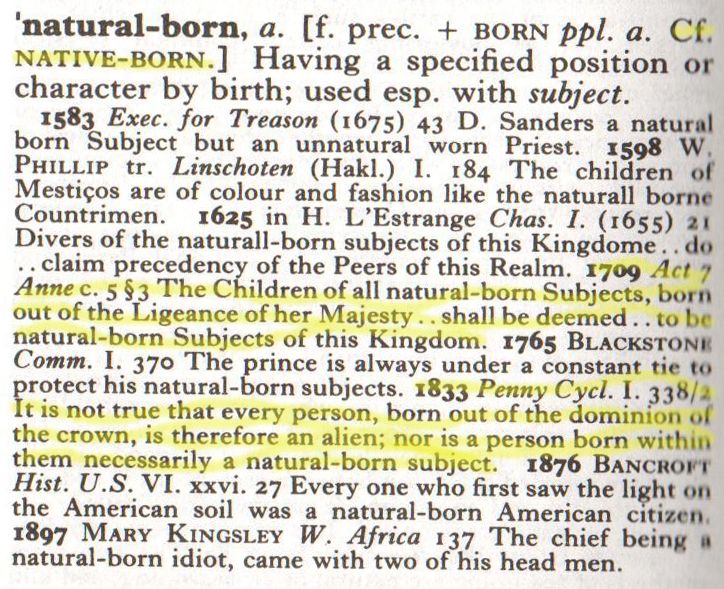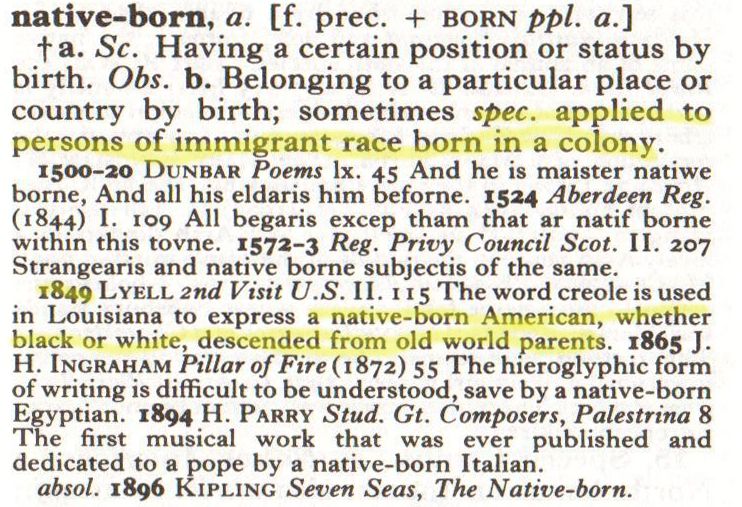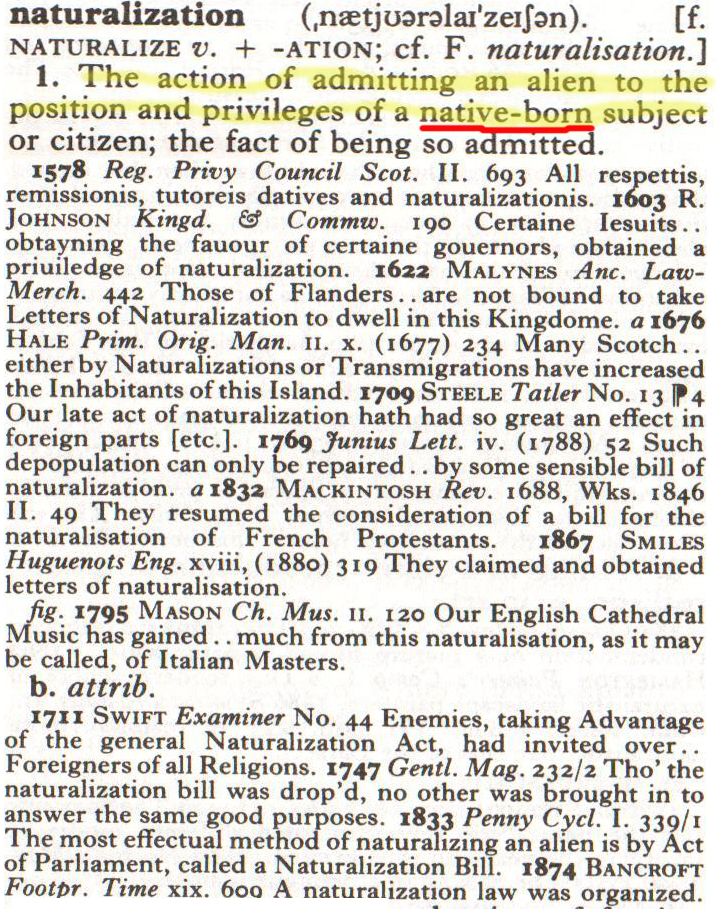Skip to comments.
On Constitutional Eligibility
ML/NJ
Posted on 01/15/2016 2:03:15 PM PST by ml/nj
The Constitution says that to be eligible to be President of the United States a person must, among other things, be a natural-born citizen. Elsewhere it says that Congress is given the power to establish rules of naturalization. It is absurd to think that the passage of time and/or Congress can change the definition of natural-born, as that would effectively give the Congress (or the passage of time) the power to amend the Constitution outside the provisions of Article V of the Constitution. So to establish what WAS meant by natural-born in 1787 when the Constitution was drafted, we need some sort of History of the English Language. And that is what the Oxford English Dictionary is. It is much more than a dictionary. It is a history of meanings and usages of words over time.
So first we should look up natural-born.

This and the two other definitions presented here come from the Second Edition of the OED first published in 1989 and then republished with corrections in 1991.
I think the most important part of this entry is the suggestion to compare this definition with that of native-born. This suggests to me that the two phrases have slightly different meanings and might be confused with one another. So here is what the OED says about native-born. (Note that by 1876, natural-born did morph into considering place of birth determinative, but that back in 1833 this was definitely not the case.)

The difference between natural-born and native-born is that parents do not matter for the latter, but they do for the former. There is one other definition that is important to this discussion and it is the one that defines that power of naturalization that was given to Congress. Here it is.

So that power given to Congress is to declare that those who would not otherwise be citizens, i.e. aliens, have the same standing as if they were native-born, NOT natural-born.
Now there is some ambiguity here. The definition of natural-born is given of plural children of plural parents. It is not entirely unreasonable to read this as a child of at least one citizen should be considered natural-born, though some who read it that way might also insist that the father is the one to confer this status. My own opinion is that both parents must have been citizens at the time of ones birth and that the place of birth is irrelevant regarding natural-born status. This should have eliminated Barack Obama, and because I believe he is ineligible, I really hope the Republicans do not nominate Ted Cruz, his political positions notwithstanding.
ML/NJ
TOPICS: Constitution/Conservatism; News/Current Events; Politics/Elections; Your Opinion/Questions
KEYWORDS: birthcertificate; certifigate; cruz; naturalborncitizen; obama; usurper
Navigation: use the links below to view more comments.
first previous 1-20, 21-40, 41-60, 61-76 last
To: Cold Heat
A person born out of the jurisdiction of the United States can only become a citizen by being naturalized
either by
treaty, as in the case of the annexation of foreign territory,
or by
authority of congress, exercised
either by
declaring certain classes of persons to be citizens, as in the enactments conferring citizenship upon foreign-born children of citizens,
or by
enabling foreigners individually to become citizens by proceedings in the judicial tribunals, as in the ordinary provisions of the naturalization acts.
U.S. v. Wong Kim Ark, 169 U.S. 649, 702-703
61
posted on
01/15/2016 8:49:55 PM PST
by
Ray76
To: Ray76
The right to naturalize and write the statutes to do it was given to congress at the same time Natural born status was given to Ted Cruz.
You can believe what you like. Even if it's wrong, but I only tried to make the case that you are.
To sum it up one more time, this is the 20th century view and current understanding.
Status as a natural-born citizen of the United States is one of the eligibility requirements established in the United States Constitution for election to the office of President or Vice President. This requirement was intended to protect the nation from foreign influence.[1]
The U.S. Constitution uses but does not define the phrase "natural born Citizen", and various opinions have been offered over time regarding its precise meaning. The consensus of early 21st-century constitutional and legal scholars, together with relevant case law, is that natural-born citizens include, subject to exceptions, those born in the United States, and perhaps those born elsewhere if they meet the legal requirements for U.S. citizenship "at birth".[2]
The natural-born-citizen clause has been mentioned in passing in several decisions of the United States Supreme Court, and by some lower courts that have addressed eligibility challenges, but the Supreme Court has never directly addressed the question of a specific presidential or vice-presidential candidate's eligibility as a natural-born citizen.
Many eligibility lawsuits from the 2008 and 2012 election cycles were dismissed in lower courts due to the challengers' difficulty in showing that they had standing to raise legal objections. Additionally, some experts have suggested that the precise meaning of the natural-born-citizen clause may never be decided by the courts because, in the end, presidential eligibility may be determined to be a non-justiciable political question that can be decided only by Congress rather than by the judicial branch of government.[3][4]
To: Ray76
The use of the phrase “natural born” was not without precedent. Statutes in England prior to American independence used the phrase “natural born subject”. For example, the British Foreign Protestants Naturalization Act 1708:
The children of all natural born subjects born out of the ligeance [i.e. out of England] of Her Majesty Her Heirs and Successors shall be deemed and adjudged to be natural born subjects of this Kingdom to all intents, constructions, and purposes whatsoever.[8][9]
The famed jurist William Blackstone wrote in 1765 that inhabitants born within England may be natural-born subjects: “Natural-born subjects are such as are born within the dominions of the crown of England....”[10][9] Blackstone added that offspring who are not inhabitants may also be natural born subjects:[10][11]
But by several more modern statutes ... all children, born out of the king’s ligeance, whose fathers were natural-born subjects, are now natural-born subjects themselves, to all intents and purposes, without any exception; unless their said fathers were attainted, or banished beyond sea, for high treason; or were then in the service of a prince at enmity with Great Britain.
A leading authority in England prior to Blackstone was Edward Coke, who wrote about this subject in Calvin’s Case.[12] According to Coke: “[I]f any of the King’s ambassadors in foreign nations, have children there of their wives, being English women, by the common laws of England they are natural-born subjects, and yet they are born out-of the King’s dominions.”[13]
The term “natural born” has often been used synonymously with “native born”.[14] The English lexicographer Samuel Johnson wrote in 1756 that the word “natural” means “native,” and that the word “native” may mean either an “inhabitant” or an “offspring”.[15]
To: Ray76
The Constitution does not explain the meaning of “natural born”.[16] On June 18, 1787, Alexander Hamilton submitted to the Convention a sketch of a plan of government.[17] The sketch provided for an executive “Governour” but had no eligibility requirements.[18] At the close of the Convention, Hamilton conveyed a paper to James Madison he said delineated the Constitution that he wished had been proposed by the Convention; he had stated its principles during the deliberations. Max Farrand wrote that it “...was not submitted to the Convention and has no further value than attaches to the personal opinions of Hamilton.”[19] Article IX, section 1 of Hamilton’s draft constitution provided: “No person shall be eligible to the office of President of the United States unless he be now a Citizen of one of the States, or hereafter be born a Citizen of the United States.”[20]
On July 25, 1787, John Jay wrote to George Washington, presiding officer of the Convention:
Permit me to hint, whether it would not be wise and seasonable to provide a strong check to the admission of Foreigners into the administration of our national Government, and to declare expressly that the Command in chief of the American army shall not be given to, nor devolve on, any but a natural born Citizen.[22]
While the Committee on Detail originally proposed that the President must be merely a citizen as well as a resident for 21 years, the Committee of Eleven changed “citizen” to “natural born citizen” without recorded explanation after receiving Jay’s letter. The Convention accepted the change without further recorded debate.[23]
To: Cold Heat
> The right to naturalize and write the statutes to do it was given to congress at the same time Natural born status was given to Ted Cruz.
Do you even read the gobbledegook you write?
65
posted on
01/15/2016 9:14:29 PM PST
by
Ray76
To: Ray76
Congressional Research Service[edit]
In 2000, the Congressional Research Service (CRS), in one of its reports, wrote most constitutional scholars interpret the natural born citizen clause as to include citizens born outside the United States to parents who are U.S. citizens. This same CRS report also asserts that citizens born in the District of Columbia, Guam, Puerto Rico, and the U.S. Virgin Islands, are legally defined as “natural born” citizens and are, therefore, also eligible to be elected President.[59]
A 2009 CRS report stated:
Considering the history of the constitutional qualifications provision, the common use and meaning of the phrase “natural-born subject” in England and in the Colonies in the 1700s, the clause’s apparent intent, the subsequent action of the first Congress in enacting the Naturalization Act of 1790 (expressly defining the term “natural born citizen” to include a person born abroad to parents who are United States citizens), as well as subsequent Supreme Court dicta, it appears that the most logical inferences would indicate that the phrase “natural born Citizen” would mean a person who is entitled to U.S. citizenship “at birth” or “by birth”.[60]
A 2011 CRS report stated:
The weight of legal and historical authority indicates that the term “natural born” citizen would mean a person who is entitled to U.S. citizenship “by birth” or “at birth,” either by being born “in” the United States and under its jurisdiction, even those born to alien parents; by being born abroad to U.S. citizen-parents; or by being born in other situations meeting legal requirements for U.S. citizenship “at birth.” Such term, however, would not include a person who was not a U.S. citizen by birth or at birth, and who was thus born an “alien” required to go through the legal process of “naturalization” to become a U.S. citizen.[2]
A 2016 CRS report, however, stated:
Although the eligibility of U.S. born citizens has been settled law for more than a century, there have been legitimate legal issues raised concerning those born outside of the country to U.S. citizens. From historical material and case law, it appears that the common understanding of the term “natural born†in England and in the American colonies in the 1700s included both the strict common law meaning as born in the territory (jus soli), as well as the statutory laws adopted in England since at least 1350, which included children born abroad to British fathers (jus sanguinis, the law of descent). Legal scholars in the field of citizenship have asserted that this common understanding and legal meaning in England and in the American colonies was incorporated into the usage and intent of the term in the U.S. Constitution to include those who are citizens at birth.[61]
To: Ray76
It was in the 14th...
They took any power that the states thought they had in section 1, and gave congress the authority to regulate it by statute in section 5.
This effectively isolated the Constitution from any state bullshit. it also reminded congress of their responsibility to manage naturalization.
I did not think it was Gobbledygook.
To: Cold Heat
BTW, as you know...I guess...the natural born language was in article 2. They did not explain it, define it or give congress authority to naturalize.
The 14th gave congress the role of naturalization as they were expecting a heard of immigrants. But they still had not defined natural born and have not.
This was not passed until 1868.
To: Cold Heat
Funny that this congress seems to want another
Bush in the Whitehouse.
69
posted on
01/15/2016 10:00:27 PM PST
by
justrepublican
(Screaming like a "Vexatious requester" at a Wellstone memorial...........)
To: justrepublican
Well, I don’t think it’s funny..
It seems that republicans, and especially the DC Congressional caucus, as a whole seem to be very comfortable with goodie two shoes pragmatic leaders that they can manipulate., make deals with that seem to be in their favor.
Cruz does not comport to that requirement, nor does Trump for entirely different reasons.
Bush, Kasich, etal are preferred.
To: Cold Heat
Damages, understood. I firmly believe all citizens casting a vote for an ineligible candidate are damaged. Damaged in the most egregious way to a republic possible: their votes did not count. And, barring that, Alan Keys was absolutely damaged. Likewise, the republican candidates would have a similar position.
You may believe that because Obama escaped scrutiny and Alan Keyes was denied, that similarly Cruz (and Trump?) would escape scrutiny. But I believe this is an all-too-common fallacy in thinking among we conservatives. We trust our debate opponents to play by the rules. History shows time and time again ... criminals, islamists, and liberals don't play by the rules.
I suspect, confidently, a liberal judge at some point in some state will grant standing. And ... it only takes one to unravel this knit. Cruz has a little time only because the courts refrain from providing consultation and influencing future events. But the moment a potentially ineligible candidate becomes the presumptive nominee, damages exist genuinely, and the game is afoot.
71
posted on
01/16/2016 5:59:43 AM PST
by
so_real
( "The Congress of the United States recommends and approves the Holy Bible for use in all schools.")
To: Cold Heat
Agreed. Rubio is dangerous. He's young, energetic, and attractive. He is willing to follow the script with fact checking himself, and has no qualms making specious arguments to attack an opponent. Like Mitt Romney, that makes him the dream child for the next generation of GOP-E. On the topic of Rubio, FRiend, we agree entirely.
72
posted on
01/16/2016 6:03:27 AM PST
by
so_real
( "The Congress of the United States recommends and approves the Holy Bible for use in all schools.")
To: ml/nj
Which is exactly it. The change between the language in the 1790 and 1795 Naturalization acts opened and closed the *at the time of the Adoption of this Constitution* window, forever severing the ability of government to do anything other than exercise its naturalization power given to it by the Constitution.
Researching through documents pulls up entries to support this.
---
North Noonday Mining Co vs Orient Mining Co found in The Federal Reporter, page 527, Copyright 1880
All persons born or naturalized In the United States and subject to the jurisdiction thereof are citizens of the United States. A person born in a foreign country out of the Jurisdiction of the United States whose father is not a citizen of the United States can only become a citizen by naturalization.
**
Wong Kim Ark 1898
A person born out of the jurisdiction of the United States can only become a citizen by being naturalized, either by treaty, as in the case of the annexation of foreign territory, or by authority of congress, exercised either by declaring certain classes of persons to be citizens, as in the enactments conferring citizenship upon foreign-born children of citizens,..
**
Citizenship of the United States, Expatriation, and Protection Abroad, By United States. Dept. of State, Page 141, 1906
A person born in a foreign country, out of the jurisdiction of the United States, whose father is not a citizen of the United States, can only become a citizen by naturalization. The foreign born son becomes a citizen by being himself naturalized, or by the naturalization of the father during the minority of the son.
-----
Thanks SO much for the research and your post. It fixes the conflict that seems to appear in the two terms that's I've seen.
That's what so many people don't get, too - When the statutes say US citizen or citizen of the United States, it's NOT saying natural born.
73
posted on
01/16/2016 6:28:58 AM PST
by
MamaTexan
(I am a person as created by the Law of Nature, not a person as created by the laws of Man.)
To: so_real; Cold Heat
"He is willing to follow the script with without fact checking himself ..."
Arg -- posted too quickly.
74
posted on
01/16/2016 8:27:35 AM PST
by
so_real
( "The Congress of the United States recommends and approves the Holy Bible for use in all schools.")
To: Cold Heat
Under your interpretation, Donald trump would not qualify. I believe you are incorrect. Trump's mother was naturalized in 1942. Trump's father was born in Queens, NY. Trump was born in 1946. So both his parents were citizens at the time of his birth, which I believe is what was intended by the Framers when they used the phrase natural-born.
ML/NJ
75
posted on
01/16/2016 11:12:33 AM PST
by
ml/nj
To: Cold Heat
76
posted on
01/16/2016 11:24:42 AM PST
by
ml/nj
Navigation: use the links below to view more comments.
first previous 1-20, 21-40, 41-60, 61-76 last
Disclaimer:
Opinions posted on Free Republic are those of the individual
posters and do not necessarily represent the opinion of Free Republic or its
management. All materials posted herein are protected by copyright law and the
exemption for fair use of copyrighted works.
FreeRepublic.com is powered by software copyright 2000-2008 John Robinson


